Politics
AK Party academy revolutionizes Turkish political training
Launched in 2008 under the leadership of President Recep Tayyip Erdoğan, the Justice and Development Party’s (AK Party) Political Academy has become one of the most influential political education programs in Turkish history.
Conceived by former Yozgat deputy and academic Osman Coşkun, the project began in 20 cities. It quickly spread to all 81 provinces, training tens of thousands in the principles and practice of politics.
Coşkun, also Türkiye’s chief auditor for personal development and total quality management, recalls identifying a gap in structured political training within party ranks.
“I proposed an academy run by experts, financed sustainably and open to everyone from mayoral candidates to grassroots members,” he said.
Erdoğan embraced the idea, assigning Coşkun to oversee its implementation.
The response was immediate. Following Erdoğan’s announcement at a party group meeting, applications poured in nationwide.
From the first sessions in January 2008, the academy stood out for blending theory with practical skills, covering areas such as constitutional law, democracy, leadership, elections, governance, communication, protocol and public speaking.
Certification, performance evaluation and awards strengthened its professional framework.
Erdoğan often delivered the opening lectures himself, highlighting the program’s importance for Türkiye’s political future.
Sustained for more than 15 years, the academy ranks among the few global examples, outside China’s Communist Party, of long-term, large-scale political training, according to Coşkun.
“I am proud to have helped create a platform that enhances political quality, broadens participation, and produces well-prepared cadres,” Coşkun said.
Nationwide outreach
With one of the largest political followings, the AK Party continues to strive for enhanced outreach, particularly in explaining its new “terror-free Türkiye” initiative.
Following its workshop last month on a strategic roadmap for 2026, the party has dedicated August entirely to fieldwork, listening to citizens’ concerns and sharing its roadmap.
Senior party figures, including deputy chairpersons and MPs, will meet with communities nationwide as the party prepares to celebrate its anniversary on Aug. 14. Although parliament is in recess until Oct. 1, the terror-free Türkiye committee will begin its work on Aug. 5.
Under the “Century of Türkiye City Meetings” program, the AK Party will visit trade chambers, bar associations, nongovernmental organizations (NGOs), and small businesses, gathering feedback to inform the shaping of future policies.
Reports from these meetings will be sent to party headquarters for evaluation, ensuring that citizens’ voices remain central to the AK Party’s political vision.
Politics
Türkiye’s multidimensional strategic presence increases in Africa
As Africa rises in strategic potential with its young population and rich resources on the international stage, Türkiye continues to deepen its relations with the continent by the day.
The economic development moves, regional integration projects and incentives toward foreign investors of African countries increase the continent’s global influence. Africa, which harbors around 18% of the world population, draws the interest of many countries not only in terms of human resources but also with its growing consumer market.
Africa has approximately 40% of the world’s gold reserves, 60% of cobalt and a significant portion of oil and natural gas reserves. Interest from especially China, the U.S., the EU, India and Gulf countries is growing.
Türkiye, meanwhile, has been investing in its ties with the continent through infrastructure investments, development projects, military cooperation, as well as education programs among other fields.
As part of its foreign policy toward the continent, Türkiye increased the number of its embassies in Africa from 12 in 2002 to 44 by 2024.
African countries also increased their embassies in Türkiye, and the number of African embassies in Ankara rose from 10 in 2008 to 38 in 2024.
Ankara’s increasing diplomatic representations on the continent have led to stronger ties, especially in political, economic and cultural areas. The number of mutual visits in the past five years has exceeded 500.
President Recep Tayyip Erdoğan has made 53 visits to 31 African countries, making him the leader who has visited the continent most often.
As a sign of its growing influence, Ankara has since taken on the role of mediator in talks between Ethiopia and Somalia, which have been locked in a feud over access to the ocean since June.
The number of agreements Türkiye has signed with African countries has also grown significantly.
Trade ties
Ankara has entered into trade and economic cooperation agreements with 49 African nations, signed agreements on the reciprocal promotion and protection of investments with 32 countries, double taxation avoidance agreements with 17 nations, military framework agreements with 35 countries, military training cooperation agreements with 21 nations and defense industry cooperation agreements with 29 countries.
Furthermore, business councils have been formed with 49 African countries, covering nearly the entire continent.
Türkiye’s trade with Africa grew nearly nine times, from $4.3 billion in 2002 to $36.6 billion by 2024. Its investments in Africa rose from $67 million in 2003 to $10 billion in 2024.
Furthermore, Turkish contractors completed 2,031 projects in Africa, worth $97 billion, by the end of 2024.
Türkiye’s official export finance institution, Türk Eximbank, became the AFC’s first non-African investor in December 2023, upon the invitation of the African Finance Corporation (AFC).
Moreover, Turkish Airlines (THY) has made significant strides in connecting Africa to the world, currently serving 62 destinations in 41 countries across the continent. It notably became the first airline to resume operations in Mogadishu in 2012 after the airport was rebuilt with Turkish assistance.
Other Turkish institutions are similarly active in Africa. As of the end of 2024, approximately 62,000 African students were pursuing higher education in Türkiye through the Türkiye Scholarships program.
Additionally, the Turkish Cooperation and Coordination Agency (TIKA) has 22 active representatives in Africa.
Meanwhile, the Yunus Emre Institute (YEE) Turkish Cultural Center offers Turkish lessons to Africans and promotes Turkish culture at 18 centers across 15 African countries.
The Turkish Maarif Foundation also educates around 25,000 students at more than 230 institutions in 27 African countries.
Defense cooperation
Türkiye has also extended its successful defense industry collaborations to African countries. Leading Turkish companies such as Baykar, Aselsan, Tusaş and Nurol Holding have seen rising demand for their products on the continent. These defense partnerships and related initiatives continue to strengthen bilateral trade.
According to data from the Turkish Exporters Assembly (TIM), Türkiye’s total exports to African nations rose by 1.7% in 2024, reaching $19.4 billion. Egypt was Türkiye’s top African export destination last year at $3.5 billion, followed by Morocco with $3.1 billion and Libya with $2.5 billion.
Türkiye has also expanded defense cooperation with several African countries, including Libya, Somalia, Niger, Chad and Sudan. Under a 2019 memorandum of understanding on military and security cooperation, Türkiye continues to provide military training and consultancy services in Libya.
Politics
AK Party executive committee to discuss terror-free initiative
The ruling Justice and Development Party’s (AK Party) central executive committee is set to convene Wednesday to discuss the terror-free Türkiye initiative.
AK Party members will review the work of the parliamentary terror-free Türkiye committee, which held its inaugural meeting Tuesday at Parliament. An informational report on the committee’s efforts will be presented.
The 51-member committee, comprised of legislators from most major parties, is charged with proposing and supervising legal and political reforms following the PKK terrorist group’s decision to disband and lay down arms, ending a four-decade-long terror campaign that claimed over 40,000 lives.
The AK Party’s upcoming Türkiye Meetings program, set to launch this weekend, is also expected to be on the agenda.
In addition, the Health Ministry will deliver a presentation, following up on proposals made by the party’s Health Policies Department during the executive committee meeting two weeks ago.
The situation in Gaza will also be discussed, particularly in light of Israel’s ongoing attacks and embargoes. Erdoğan, who has recently stepped up diplomatic activity on the issue, is expected to deliver messages on Gaza during the meeting.
Politics
Terror-free Türkiye committee convenes for first time
Speaking at the first meeting of a parliamentary committee on the terror-free Türkiye initiative in Ankara on Tuesday, Parliament Speaker Numan Kurtulmuş said Türkiye was at a turning point, a vital moment to shape the country’s future.
The committee, comprised of 48 lawmakers from most parties represented at Parliament, will weigh how the initiative will proceed, especially in terms of laws and regulations regarding the status of the PKK terrorist group and its members. This may include lenient sentences for surrendering members of the group.
Parliamentarians from the ruling Justice and Development Party (AK Party), its ally Nationalist Movement Party (MHP), the main opposition Republican People’s Party (CHP), the Peoples’ Equality and Democracy Party (DEM Party), the New Path bloc, the Türkiye Labor Party (TIP), the Labor Party (EMEP), the New Welfare Party (YRP), the Democratic Left Party (DSP), the Free Cause Party (HÜDA-PAR) and the Democrat Party (DP) attended the inaugural meeting of the committee, which was expected to define working methods of the group.
Although Parliament is in summer recess, the committee will continue to work without interruption. Kurtulmuş will serve as chairperson but is not eligible to vote in the committee’s voting processes. AK Party’s committee members include former Justice Minister Abdülhamit Gül. CHP’s committee members will consist of Deputy Parliamentary Group Chair Murat Emir, Deputy Chairs Gökçe Gökçen and Murat Bakan, and lawmakers from Istanbul, Diyarbakır, Ankara and Muğla. Among them are Türkan Elçi, the widow of Diyarbakır Bar Association’s former Chair Tahir Elçi, who died in 2015 in crossfire during a shootout between police officers and PKK members, and Sezgin Tanrıkulu, a prominent parliamentarian who has often made headlines for his heavy criticism of counterterrorism efforts.
The committee will not directly propose bills but will likely refer its reports to other subcommittees of Parliament, which will then discuss and vote on bills for their referral to the Parliament’s General Assembly. The General Assembly is the ultimate authority in Parliament to pass laws. Throughout its tenure, the committee will also hear statements of actors involved or affected by the initiative, from the National Intelligence Organization (MIT), which monitors the PKK’s disarmament, to families of terror victims. The committee is expected to recommend amendments in counterterrorism laws and the Turkish Penal Code to accommodate the needs of the initiative, especially in terms of the state of people convicted of terrorism or aiding and abetting the PKK.
The terror-free Türkiye initiative launched by MHP leader Devlet Bahçeli had its first tangible progress in February when the PKK’s jailed ringleader, Abdullah Öcalan, accepted Bahçeli’s call and urged the group to lay down its weapons. In May, the PKK announced it would dissolve itself. Last month, some 30 PKK members, including a senior leader, burned their weapons in a ceremony in northern Iraq. Although symbolic, the gesture marked the first time that the group has laid down arms in its campaign of violence for more than four decades. The PKK has previously announced so-called unilateral truces but has never entirely given up its ambitions.
The initiative was preceded by calls from Bahçeli and President Recep Tayyip Erdoğan to “reinforce the home front at a time of regional tensions and Israel’s expansionism.” Elimination of the PKK threat will bolster Türkiye’s role as a regional power and reinforce its economy by reducing defense expenditures utilized to fight the PKK for decades. More importantly, it will be a key stage in putting the so-called “Kurdish question” to rest. Since its foundation and first attacks in the 1980s, the PKK has exploited the Kurdish community, claiming to fight for their right to self-determination. State policies simply ignoring Kurds’ rights, such as education in Kurdish, further fueled the PKK’s violent campaign. The state stepped up counterterrorism efforts in the 1990s, but most of them backfired as controversial abductions and killings of people in the southeast, where the PKK was most active, played into the hands of the PKK’s propaganda of oppression of Kurds by the state.
President Recep Tayyip Erdoğan reached out to the Kurdish community by launching a “reconciliation process” in the 2010s, to reinstate the rights of the community so the PKK would not have room for exploitation. The process succeeded to some extent with the PKK declaring a so-called truce, but soon, Türkiye had to revert to hawkish security policies when the PKK resumed its attacks after a brief lull. Subsequently, Türkiye managed to limit the group’s presence in Iraq and Syria and the group has been unable to launch major attacks as it did in the past, thanks to the crackdown.
Kurtulmuş said in his speech on Tuesday that the committee would serve as a proxy of the nation to resolve the problems. “It is a reflection of a will to provide a new insight into an issue that sucked out the energy of this country for decades and was provoked by those seeking to sow discord. What matters most here is not making it history and solving all problems at once. It is about reminding people that Parliament is the voice of the people, a bearer of social peace, an insurer of brotherhood and a legitimate platform for finding solutions. It is about moving forward with courage, conscience, and justice, rather than political calculations and a narrow mindset. This process that began with the dissolution of the terrorist group is a matter for our revered nation directly, rather than a matter for a political structure,” he said.
“We are here to turn common suffering into a common hope. This significant problem, which had persisted for years, compelled politics and the state to act out of a security reflex. But it is high time to discuss freedom, equality and justice in addition to security. This is another mission of the committee. Every step we take should reinforce our brotherhood and peace in these ancient lands. In this context, terror-free Türkiye, as a matter of fact, means a terror-free region,” he said. He underlined the Turkish-Kurdish brotherhood dating back to the Seljuks, adding that they have to be inspired by their wisdom.
End of darkness
“A dark period blocking the path to the future is being left behind with the resolve of our nation and state. We are not drafting a new constitution here, but we will have our say on brotherhood and unity. The Parliament will remind people of a brotherhood of a thousand years,” he said. Kurtulmuş also underlined that the initiative was not the result of a bargain with the PKK. “It is a reflection of the determination of our nation to achieve unity,” he said.
“The scourge of terrorism occupied Türkiye for a long time. If we could have devoted our expenditures (to fight the PKK) elsewhere, we would have had many universities, hospitals and schools earlier. We would have a better education. We would have reached the point Türkiye is now far earlier. We would have had defense technologies, locally made helicopters, satellites we take pride in producing on our own far earlier,” he said.
Kurtulmuş also vowed that the committee would be loyal to the legacy of “all the heroes who defended the homeland at the cost of their lives,” referring to police officers, soldiers and civilians killed by the PKK. He said that one of the most important tasks for the committee was to monitor the disarmament process, and the process should be monitored and directed cautiously “through a legal framework and on a social basis.”
“It is important to manage social mindset properly. A rhetoric failing to protect the dignity of Kurds and ignoring the pride of Turks would not lead to peace,” he said.
In a written statement on Monday, Bahçeli said there was “no place or time for skepticism.”
“(Türkiye) is going through historic developments in a terror-free initiative. Efforts to thwart it, the pursuit of sabotage in advance of the committee’s work is a campaign aimed at undermining the initiative. I am fully confident that parties contributing to the committee will resist this sinister, dirty campaign,” he said.
Bahçeli said that politics had a successful record and the skills to counter developments overshadowing the process, guided by morals and sanity, and to avoid the dead ends created by the conjuncture. He emphasized that the experience demonstrated that countries without a culture of troubleshooting often fail to distance themselves from being drawn into crisis-oriented contradictions. He added that the Turkish nation has proven, especially in recent years, its ability to confront chronic and severe issues with courage and resilience.
He said Türkiye had a clear path ahead regardless of “dark propaganda.” “This flag raised once will not go down, will not be overshadowed. The Nationalist Movement Party and People’s Alliance promise it. The existence of any influential force that will stop or hinder Türkiye from being cleared of terrorism is just a dream now. The siege is over, and the regional, global conspiracy has been countered. Terror-free Türkiye is a strong Türkiye that has renewed its national unity and brotherhood,” Bahçeli stated.
The MHP leader acknowledged the existence of “those who struggled to adapt to the new normal.”
“Within this context, some cheap and absurd accusations circulating are not so much about adaptation problems but rather about the multifaceted destruction, restriction and damage to a historic opportunity that has been seized. Those who see a Türkiye free of terrorism as contrary to their political and ideological interests are eager to stir up storms in a teacup. Their growing demands and appetites have recently intensified and become widespread,” he said about critics of the initiative.
“Narrow-minded individuals who thrive on the status quo, dependent factions longing for tutelage, so-called nationalists with unclear loyalties, vile circles investing in lies and gossip, and collaborators eager to serve imperialism and Zionism have collectively united to undermine and damage the vision of a terror-free Türkiye. Those who cannot comprehend, let alone articulate, the complex web of regional dynamics and global equations – issues that have grown increasingly serious and multifaceted – naturally lack the will and their claims are meaningless,” he said.
Commenting on the Good Party’s (IP) refusal to join the committee, Bahçeli said: “The baseless, unjust and shameless criticisms by irresponsible people are unserious and worthless statements,” he said.
The IP joined forces with the Victory Party (ZP) to oppose the initiative, and both parties were founded and populated by former members of the MHP. “Those who once sought to poison and chain the MHP by wearing every mask, plotting every trap, seeking help from anyone and joining disgraceful alliances must especially know that betrayal is inherent in their persons and politics,” Bahçeli said.
Bahçeli emphasized that the CHP’s decision to provide members to the commission starting work in Parliament is a valuable step and added, “Insisting on preconditions that would derail the process is just as meaningless and illogical,” referring to the party’s set of conditions prior to joining the committee, especially for the release of politicians linked to the PKK convicted of terror charges.
“Türkiye will permanently overcome the scourge of terrorism. Taking a supportive and appropriate stance – one that facilitates rather than complicates, embraces the dignity and sentiments of our nation rather than avoiding compromise – is undoubtedly a great need for constructive and supportive political posture,” Bahçeli stated.
MHP Deputy Chair Feti Yıldız, a member of the committee, told the first meeting that the new initiative was not a new version of the reconciliation process. “It will not be repeated and revived,” Yıldız said. “We have a great opportunity and we should not squander it. We have to try to understand each other instead of attacking the reputation of each other. We need a stance that is not hostile to other political parties,” Yıldız said.
The Istanbul lawmaker for MHP stated that the committee had a responsibility toward innocent people who paid a heavy price due to terrorism, “from our troops and police to teachers, all martyrs and veterans.” Yıldız said Türkiye has been very successful in maintaining the process as political parties did not seek assistance from elsewhere, “in the Middle East, where all kinds of intrigue are taking place.”
The DEM Party’s deputy parliamentary group chair, Gülistan Kılıç Koçyiğit, told the meeting that they were aware of the “historic responsibility” at the committee and pledged that they would be constructive and solution-oriented. “All citizens of Türkiye need a new beginning,” the DEM Party lawmaker Meral Danış Beştaş told the meeting.
Politics
Greece warns Türkiye over EU funds, ties with Athens
Türkiye is not going to take advantage of European loans or the bloc’s Security Action for Europe (SAFE) program if it “does not show practical examples of improving its relations with Greece,” Greek Prime Minister Kyriakos Mitsotakis said on Sunday.
In an interview with Greece’s OEMA newspaper, Mitsotakis said he repeated that: “if Türkiye does not stop promoting the non-existent theory of gray zones, it will not enter the European Union’s cheap loan program.”
Türkiye, which is a member of NATO but not the EU, is technically eligible to access EU defense industry financing and joint procurement programs as part of the bloc’s 150-billion-euro ($176-billion) Security Action for Europe (SAFE) initiative.
He said that he himself worked to strengthen the Greek Armed Forces, meanwhile. “In a year from now, we will have three ultramodern frigates. We succeeded with Türkiye and overturned the balance in the air, and we have a significant strategic advantage.”
“In terms of bilateral relations, we can do less. In terms of the EU’s relations with Türkiye, we can do much more. And we have already done so,” he added.
Mitsotakis previously mentioned these statements last week on Skai TV. Mitsotakis pointed out that all 27 EU members would have to agree before Türkiye could access SAFE funds.
“Unanimity is required,” he stressed.
His comments came hours after Germany said it had approved the delivery of Eurofighter jets to Türkiye.
Türkiye had been in talks for several years on buying 40 of the aircraft, which are constructed by a consortium from Germany, Britain, Italy and Spain.
After a long period of tensions marked by disputes over irregular migration, the Cyprus dispute, energy exploration and territorial sovereignty in the Aegean, Türkiye and Greece have been taking confidence-building steps for a fragile normalization of their relations, which moved into a new chapter with Erdoğan’s landmark visit to Athens in 2023. During the visit, the sides announced a friendship declaration, visa facilitation for Turkish citizens to visit 10 Greek islands in the northern Aegean, and a decrease in the flow of irregular migrants to Greece.
Tensions rose again recently with Athens’ new move raising further disputes.
Earlier this year, Greece released a marine spatial planning map, which Türkiye said violates its maritime jurisdiction in the Aegean Sea and the Eastern Mediterranean.
Politics
Türkiye, Syria discuss strengthening security cooperation
Vice President Cevdet Yılmaz met with Syrian Interior Minister Enes Hattab at the Presidential Complex in Ankara to discuss strengthening security cooperation between the two countries. Turkish Interior Minister Ali Yerlikaya also attended the meeting.
Following the talks, Yılmaz underscored the importance of stability in Syria for the region’s peace and prosperity.
“Strengthening security in Syria is vital for the consolidation of internal peace, economic development and social welfare,” he said on social media platform X.
Yılmaz reaffirmed Türkiye’s commitment to supporting Syria’s stability, institutional development and governance that embraces all sectors of society.
“As the Republic of Türkiye, we will continue to support Syria’s stability, the development of its institutional capacity and governance that encompasses all segments of society,” he said.
Expressing Ankara’s vision for Syria’s future, Yılmaz voiced hope for a political environment in which “our Syrian brothers and sisters can equally enjoy fundamental rights and freedoms under an inclusive and legitimate government.”
The vice president also reiterated Türkiye’s longstanding position on the need to safeguard Syria’s sovereignty and territorial integrity. “We will continue to strongly support Syria’s stability, territorial integrity, and sovereignty,” he emphasized.
The meeting comes as Türkiye and Syria consider deeper cooperation in the post-Assad era amid growing concerns over the U.S.-backed terrorist group YPG.
Ankara has pledged to continue supporting Syria’s political unity and territorial integrity, providing training and technical support upon request from Damascus to strengthen its fight against terrorist groups.
Ankara is closely monitoring the integration of the PKK terrorist group’s Syrian wing, the YPG, into the Syrian army, a process expected to conclude by the end of the year. Turkish officials have said this development will be decisive for Syria’s long-term security architecture.
The new Syrian government, established after the ouster of former regime leader Bashar Assad on Dec. 8, 2024, has been working to restore order nationwide. Ankara, which has developed cordial ties with the new leadership, has repeatedly offered operational and military assistance to Damascus to combat Daesh and other terrorist threats.
President Recep Tayyip Erdoğan has vowed that Türkiye “will not allow terrorists to drag Syria back into chaos and instability.”
Türkiye, Syria, Jordan and Iraq have activated the Counter-Daesh Coordination Cell, as announced by Foreign Minister Hakan Fidan last month. The joint mechanism aims to eliminate remaining Daesh threats, making it unnecessary for the West to rely on YPG militants in the fight against terrorism.
With security and counterterrorism at the forefront, Ankara views its cooperation with Damascus as central to ensuring a stable, sovereign and territorially unified Syria.
Politics
Erdoğan to visit Ukraine, free trade on agenda: Envoy
Ukraine’s Türkiye Ambassador Nariman Dzhelyal said Kyiv will soon host President Recep Tayyip Erdoğan. Quoted by the RBC-Ukraine website on Monday, Dzhelyal stated that they were working to schedule the visit following a personal invitation to Erdoğan by President Volodymyr Zelenskyy.
The envoy said ratification of a free trade agreement between the two countries will likely be discussed during the Turkish leader’s visit. “This visit requires significant effort, as many issues are hindering its realization,” Dzhelyal said.
Erdoğan paid a visit to Ukraine in August 2022, his first since the start of the Russia-Ukraine conflict, and held a trilateral meeting with Zelenskyy and U.N. Secretary-General Antonio Guterres. In that visit, Erdoğan pledged assistance to Ukraine for rebuilding and recovery. Zelenskyy, on the other hand, is a frequent visitor to Türkiye and last met Erdoğan in Ankara in May.
Last month, Erdoğan told reporters that Türkiye wanted to bring together leaders of Ukraine, Russia and the United States to achieve peace in the ongoing war.
Additionally, last month, Türkiye hosted a meeting between Russian and Ukrainian delegations in Istanbul. The rival sides met earlier in Istanbul on May 16 and June 2 amid U.S. pressure to agree on a cease-fire to end the three-year-old conflict. Despite the urging of U.S. President Donald Trump, no breakthrough was made.
Ukrainian and Russian negotiators have so far only agreed to hold prisoner exchanges. And Russia has since launched intense air attacks on Ukraine and seized more front line territory.
Russia has demanded that Ukraine give up four regions, on top of Crimea, which it annexed in 2014. The Kremlin also insists that Ukraine should abandon any plans to join the NATO military alliance.
Ukraine has rejected the demands and expressed doubt that Russia wants a cease-fire.
Ankara is keen on boosting its international profile as a key mediator and utilizes Istanbul’s symbolic location to promote diplomacy between the parties involved in conflicts and disagreements on a global level.
NATO member Türkiye is one of the most active countries working to ensure a permanent cease-fire between Ukraine and Russia. Its delicately balanced act of assuming a role as a mediator by keeping communication channels with both warring sides open provides a glimmer of hope in diplomatic efforts to find a solution and achieve peace in the Ukraine crisis. With its unique position of maintaining friendly relations with both Russia and Ukraine, Türkiye has garnered widespread praise for its efforts to end the war.
While Ankara has opposed international sanctions aimed at isolating Moscow, it has also closed its straits to prevent some Russian vessels from crossing through them.
Dzhelyal said on Monday that ratification of a free trade agreement is important for Ukrainian businesses and strategic partnerships.
Zelenskyy said on Sunday that Kyiv is working on a list of prisoners to be exchanged with Russia, which the two sides agreed upon during their latest talks in Türkiye last month.
This came following his meeting with National Security and Defense Council Secretary Rustem Umerov and the head of the Presidential Office, Andriy Yermak, on the implementation of agreements reached in Istanbul.
After the third round of talks, Ukraine proposed a meeting of the heads of state before the end of August, and the two sides reached a consensus on continuing to exchange prisoners of war.
Vladimir Medinsky, who led Russia’s delegation at the talks, said at a press conference following the talks that both sides had completed an earlier exchange involving 1,200 prisoners of war from each side, but confirmed that they also agreed on a new prisoner swap in the same format.
“Among the key issues is the continuation of POW (prisoners of war) exchanges. There is an agreement to exchange 1,200 people and work on the lists is ongoing,” Zelenskyy said in a statement on X, noting that Umerov, who led Ukraine’s delegation at the Istanbul talks, reported to him on communications with the Russian representative.
“We are also working to unblock the return of our civilians and are verifying data on each individual,” Zelenskyy further said.
He also said that Yermak reported to him on Ukraine’s coordination with its partners in supporting Kyiv’s diplomatic efforts, particularly with the U.S., among other issues.
-

 Sports3 days ago
Sports3 days agoLuka Doncic signs $165M deal to extend Lakers stay by 3 years
-
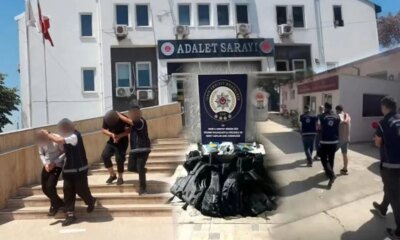
 Daily Agenda3 days ago
Daily Agenda3 days ago102 immigrant smugglers and 393 irregular immigrants were caught
-
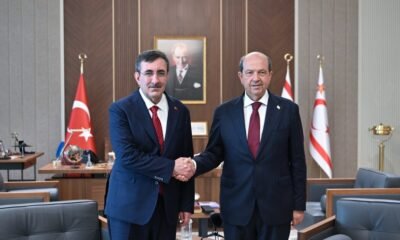
 Politics2 days ago
Politics2 days agoTürkiye, TRNC deepen cooperation in security, digital governance
-
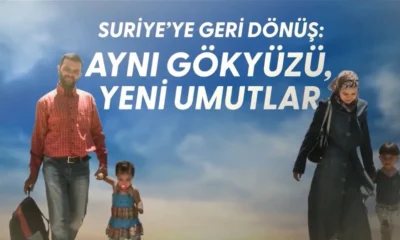
 Daily Agenda3 days ago
Daily Agenda3 days agoTürkiye, next to the Syrian brothers! Historical Number on Volunteer Return: More than 1 million Syrian returned
-
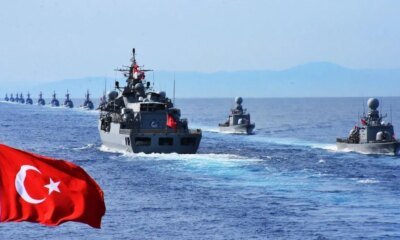
 Daily Agenda3 days ago
Daily Agenda3 days agoNew “Sea Protection Areas” added to Türkiye’s national maritime planning map
-

 Sports3 days ago
Sports3 days agoTurkish NBA star Şengün aims for EuroBasket medal, US championship
-
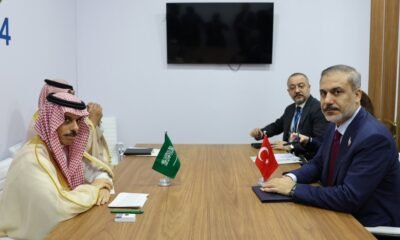
 Politics3 days ago
Politics3 days agoFM Fidan, Saudi counterpart discuss Palestinian statehood
-
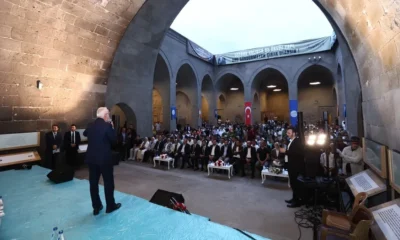
 Daily Agenda3 days ago
Daily Agenda3 days agoPresident Erdoğan was connected to the “Sözte Youth” program in Kayseri by phone.




